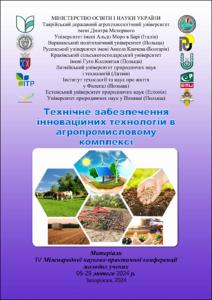Please use this identifier to cite or link to this item:
http://elar.tsatu.edu.ua/handle/123456789/17529| Title: | Stand for press works |
| Authors: | Suliz, Y. |
| Scientific director: | Дашивець, Галина Іванівна Dashyvets, Halyna |
| Keywords: | stationary presses;stationary version;hydraulic pumping station |
| Issue Date: | 2024 |
| Publisher: | Запоріжжя : ТДАТУ |
| Citation: | Suliz Y., Dashyvets Н. Stand for press works. Технічне забезпечення інноваційних технологій в агропромисловому комплексі : матеріали IV Міжнар. наук.-практ. конференції молодих учених, м. Запоріжжя, 05-29 лютого 2024 р. Запоріжжя : ТДАТУ, 2024. С. 45. |
| Abstract: | UA: The technological process of machine repair is associated with the performance of a large volume of disassembly and assembly work. Up to 35% of the disassembly and assembly operations are for pressing and unpressing various joints and connections. Various types of presses are used to perform these works. According to the principle of operation, they can be both mechanical (rail and screw), and hydraulic, pneumatic. The drive of the presses can be machine (all specified types of presses) and manual (mechanical and hydraulic) [1]. The forces that these presses develop can range from 1 to 100 kN. As a rule, the direction of action of the working rod of universal presses is vertical from top to bottom. Presses are installed stationary. The main disadvantage of stationary presses is the inconvenience of installing large-sized parts and machine assemblies on them, so in such cases it is better to use presses with remote power elements. |
| URI: | http://elar.tsatu.edu.ua/handle/123456789/17529 |
| UDC: | 621.3 |
| Appears in Collections: | Публікації здобувачів (бакалаврів. магістрів, аспірантів) |
Files in This Item:
| File | Description | Size | Format | |
|---|---|---|---|---|
| ІV conference of young scientists_MTF 2024_45.pdf | 578.72 kB | Adobe PDF |  View/Open |
Show full item record
CORE Recommender
???jsp.display-item.check???
Items in DSpace are protected by copyright, with all rights reserved, unless otherwise indicated.
